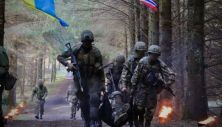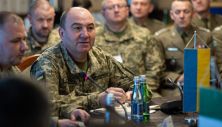After the death of the top of the private military company (PMC) “Wagner”, the Russian Ministry of Defense began to establish direct control over the “Wagnerites” in Africa. Natural wealth, enterprises, political influence over a number of African countries, as well as thousands of mercenaries on the continent are gradually coming under the direct command of the Russian Ministry of Defense, FREEDOM reports.
The Central African Republic (CAR) is home to the largest group of Wagner PMCs on the continent. Here, for the last few years, mercenaries have carried out tasks for the Kremlin and earned money. After the death of the founder of the Wagner PMC, Yevgeny Prigozhin, and the commander of the military formation, Dmitry Utkin, the Russian government takes direct control of thousands of militants.
“The Russian leadership has taken a course to neutralize the “Wagnerites” not only on the territory of Russia and Ukraine, including Belarus, but also, of course, to carry out a full rotation throughout the entire African continent, where they had indulgence in the military sphere, business, and conducting special operations, especially on shifts protection regime for precisely those proteges of the leaders of countries who supported the Russian Federation or contributed to their business,” explained the head of the Foreign Intelligence Service of Ukraine (2005-2010) Nikolai Malomuzh.
Recently, Russian Deputy Defense Minister Yunus-Bek Yevkurov and military intelligence officer Major General Andrei Averyanov visited the CAR. They informed the republic’s leadership that the Russian presence in the country remains, but now under the command of the Russian Ministry of Defense. The President of the Central African Republic, Faustin-Archange Touadera, in turn, said that only those “Wagnerites” who agree to obey the Russian Ministry of Defense will remain in the country. Evkurov and Averyanov’s tour of Africa also included stops in Mali and Burkina Faso. These are also long-standing spheres of influence of the Wagner PMC.
“And the curators in all areas of the Ministry of Defense made a decision at the highest level that it was the Ministry of Defense that would control all units that would provide security for embassies, and carry out all measures to control regimes, carry out coups, taking into account the use of force and, of course, creating conditions for more effective Russian policy in a specific country. These are Sudan, Central African Republic, Eritrea, South Africa (RSA),” Malomuzh added.
According to analysts, practically nothing has changed in the structure and work of the Russian mercenary group in Africa: most commanders have retained their posts, and the militants continue to provide services to local regimes. In return, they share income from the extraction of natural resources. And the Kremlin propaganda calls all this security.
“In the near future, we expect that most of the contracts, one way or another given to Yevgeny Prigozhin’s companies, will be divided between affiliated companies with close people of Russian President Vladimir Putin. With the same Gennady Timchenko. There are already agreements, including in Syria,” noted Ilya Davlyatchin, a journalist with the opposition Telegram channel “We Can Explain.”
According to experts, most of the operations of the Wagner PMC under the control of the Ministry of Defense will continue. After all, Africa for Russia is a field for playing strategy, where Moscow, Beijing and Western countries are fighting for control. Here the Kremlin seeks to secure not only financial benefits, but also increased political influence.
“Russian geography in Africa is very broad. Having put its roots there, Russia actually captured quite a lot of oil fields, including in Syria. Well, there are a lot of diamond deposits. That is why Putin and Timchenko, and the entire Russian leadership are placing such a big bet on Africa. Well, under the conditions of sanctions, when Russia’s supplies of various components, for example, for aircraft and weapons, have greatly decreased, Africa is such a new front,” Davlyatchin added.
At the same time, the change in control led to a disruption in the logistics of the “Wagnerites” in Africa, the Institute for the Study of War writes in its report. Because of this, the rebel coalition Coordination of Azawad Movements was able to recapture the city of Burem in Mali from the Wagner group.













